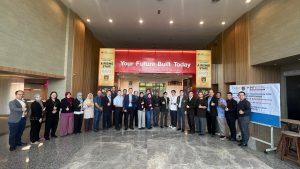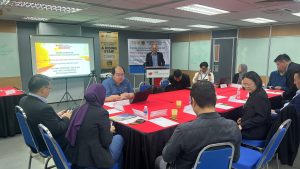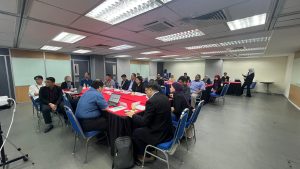At the recent Industry Advisory Board (IAB) session hosted at INTI International University, industry leaders and educators discussed how future engineers and surveyors can integrate AI into their work without losing the essential human skills that drive problem-solving and innovation. With automation and AI transforming these fields at an unprecedented pace, the session centred on a balanced approach — equipping students to leverage AI effectively while grounding them in core expertise.

Industry leaders and academicians from INTI’s Industry Advisory Board in Mechanical Engineering and Quantity Surveying convene to explore AI’s role in shaping these fields’ future.
Herbert Devan, Thermal Power Plant Senior Operations Manager at Jingxing Holdings (M) Sdn Bhd, highlighted the critical need for engineers to interpret and troubleshoot AI-generated data. “Engineers need to be trained on how to interpret data obtained from AI,” Devan explained, adding that understanding the data’s implications and the equipment involved is required. Mastering these core skills, he noted, empowers engineers to “make AI work for them, rather than letting AI dictate the process.”
For Mechanical Engineering students, Devan emphasised the importance of foundational subjects such as machine language, programmable logic controllers (PLC), and control systems, all essential for effectively integrating automation into engineering. “Engineers must master AI instead of letting AI master them,” Devan remarked, stressing that these technical skills prepare students to navigate a landscape where AI serves as a tool, not a replacement.
In Quantity Surveying, AI has also found its place, yet Ir. Richard Khoo, Managing Director of KT Perunding Sdn Bhd, highlighted the irreplaceable value of foundational knowledge. “Nothing beats Quantity Surveying’s fundamental knowledge and expertise, not even AI,” he stated. While AI enhances accuracy and speeds up processes in pre- and post-contract phases, Khoo believes it should remain a support tool. “It’s essential to balance human expertise and AI,” he continued, explaining that combining AI’s efficiency with the insights gained from years of experience allows surveyors to streamline tasks without compromising their depth of expertise.
To support these evolving industry demands, INTI International College Subang and INTI International College Penang have adapted learning outcomes and credit hours to align with technological advancements. Meanwhile, INTI International University has integrated community service initiatives into the curriculum, enabling students to apply their skills in real-world settings. Through these updates, INTI aims to ensure students gain technical AI proficiency and appreciate the value of practical, community-based experiences in building professional and ethical foundations.

Yeap Chang Lee, Head of Career Services at INTI International College Penang, conducts a briefing for academicians and industry partners, setting the stage for focused advisory discussions.
The IAB session highlighted a vision for Mechanical Engineering and Quantity Surveying at INTI, where students can leverage AI to enhance, rather than replace, the depth and precision of human expertise.

INTI’s industry partners and academicians engage in a lively discussion on integrating AI into Mechanical Engineering and Quantity Surveying while preserving essential human expertise.